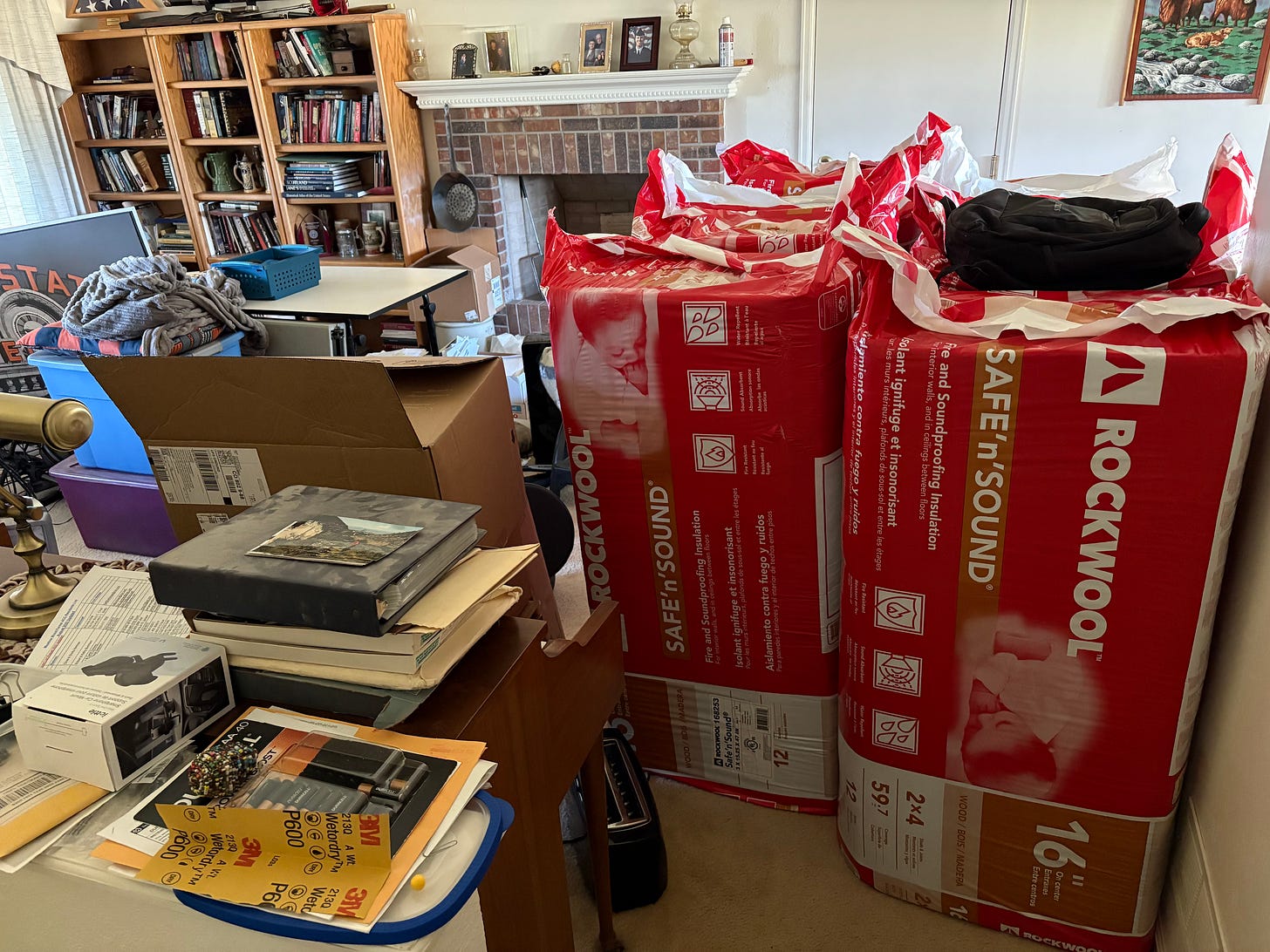This Mess Is A Place
The mess isn’t the enemy. It’s the altar. The battleground. The birthplace.
Summary
I almost waited too long to launch We Can Stay Human, not because I didn’t believe in it, but because my house was a mess. Insulation in the hallway. Sawdust on the floor. Takeout again. But then I realized: this is the place to start. The mess isn’t the enemy. It’s the altar. The battleground. The birthplace.
If you’re waiting to be whole before you begin, don’t. Start from the chaos. That’s where your humanity takes root.
Read the full post & reclaim your humanity today.
Want To Watch Or Listen?
The Full Story
The insulation bags in the hallway aren't just in the way. They're stacked like a makeshift fortress, pink fiberglass mountains forcing me to turn sideways as I navigate my way to the garage. My socks collect sawdust like memories. The drill bits scattered across the kitchen table have been my dinner companions for weeks now. This isn't just inconvenience—it's where I live.
Not a metaphor made tidy after the fact, but a living reality. These walls half-finished, the sawdust on my socks, the insulation piled in corners, the microwave meals devoured on the edge of a crowded countertop—this is where I live. And it's not waiting politely offstage for my "real" life to begin. It is my life. This is the mess. And the mess has something to say.
I almost waited too long to launch We Can Stay Human. Not because I didn't believe in it. Not because I didn't have something to say. But because the mess that comes not only with moving but renovating parts of the new space felt like a weight. Like it was siphoning off my energy, scattering my attention, making it hard to do the very work that helps me feel most alive. The creative work. The nourishing work. The human work.
It whispered: "you can feel human again after you finish this."
But what if humanity isn't found on the other side of the mess? What if remaining present in the mess is the truest act of rebellion?
The hallway is blocked for a reason. It's asking a question. The mess isn't the enemy. It's the place of becoming.
And I'm not just talking about physical clutter. I'm talking about the existential clutter of modern life. The endless scroll. The pressure to perform. The illusion of connection without intimacy. The systems that drain us. The rituals of rest we keep promising to return to.
This world is often an assault on our humanity.
So the question isn't: how do we clean it all up?
The question is: how do we stay human in the mess?
How do we stay tender when everything around us says to go hard? How do we stay present when numbness feels safer? How do we choose joy when despair seduces us with its false familiarity?
I'm not launching We Can Stay Human from a curated life. I'm launching it from my own chaos—because it's here that I'm learning what preserving our wholeness even means. And I suspect I'm not alone.
What does it mean to be human when your nervous system is fried? What does it mean to be human when your house echoes with unfinished projects? What does it mean to be human when your sacred routines have dissolved into survival?
We're told to wait until things are put together. But maybe the mess is the most honest altar we have.
The mystics have always known this. Jesus waited, thirty years, but when he showed up, it wasn't with a polished sermon. It was dusty feet and broken bread and stories told from street corners. The Buddha touched the earth under the Bodhi tree and found enlightenment not in perfection, but in silence and presence. Rumi spun through his grief until it opened to beauty, finding the divine not despite the chaos, but within it.
Our sacred traditions, our psychologies, our bodies—they all whisper the same truth: formation doesn't happen after the mess is cleaned up. It happens in it.
So here I am. Starting this work from the middle.
You won't get perfection here. You'll get a practice. A presence. A place to say:
"I'm still becoming. And you can too."
Because what we form will always form us in return. And that means this space—these words, this table we're gathering around—it matters. It is a formation space. It is a soul gym. It is a monastery of becoming fully ourselves in the middle of a world that wants to make us machines.
So let's make a pact. Not to get it all together. But to stay with it. To stay awake. To stay tender. To maintain our humanity.
Even here. Especially here.
So what does this look like in practice? How do we actually choose presence over perfection? I've created three invitations – from micro to macro – that have helped me remain whole in my own mess. Think of these not as another to-do list, but as doorways back to your humanity when the chaos threatens to overwhelm.
Three Invitations to Begin:
We can stay human. And this is where it starts.
Reclamation (60-second survival practice): Pause. Breathe. Without judgment, name three things in your current mess. Name one feeling. Name one desire. Let them all be true at the same time.
Resistance (1-hour soul practice): Pick one corner of your life—physical or emotional—and tend to it with reverence. Not to fix it. Just to listen. Just to say, "I'm here."
Rebellion (Big shift life invitation): Begin one thing now, from where you are. Write the first paragraph. Send the message. Launch the idea. Don’t wait to be ready. Let your mess be your muse.



